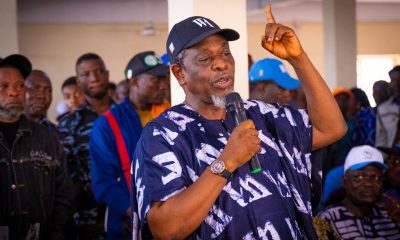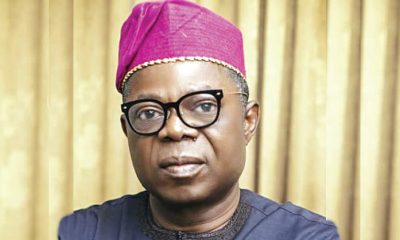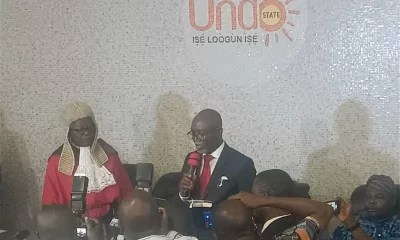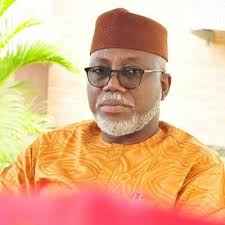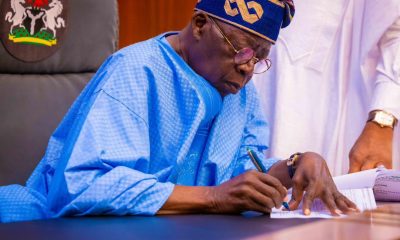Headline
Alleged misconduct: Court stops impeachment of Ondo State deputy governor
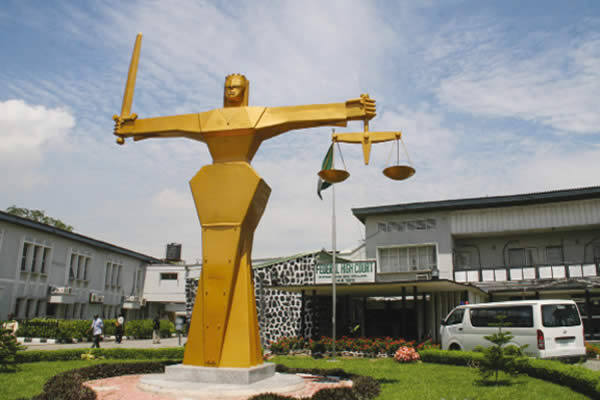
A Federal High Court, Abuja, on Tuesday, restrained the Ondo State House of Assembly from impeaching the Deputy Governor, Mr Lucky Aiyedatiwa, over alleged gross misconduct.
Justice Emeka Nwite, in a ruling shortly after Aiyedatiwa’s counsel, Kayode Adewusi, moved the ex-parte motion to the effect.
The judge also restrained Gov. Rotimi Akeredolu from nominating a new deputy governor and forward same to the lawmakers for approval pending the hearing and determination of the substantive matter.
Justice Nwite held that after listening to Adewusi, he was of the view that the interest of justice would be met by granting the application.
“Therefore, the application of the applicant succeeds,” he said.
The embattled deputy governor had, in a motion on notice marked: FHC/ABJ/CS/1294/2023, sued the Inspector-General (I-G) of Police and the the Department of State Services (DSS).
Others are Gov. Akeredoku, Speaker of the House of Assembly, Chief Judge of Ondo State and the House of Assembly as 1st to 6th respondents respectively.
In the application dated and filed by Mr Adelanke Akinrata on Sept. 21, Aiyedatiwa sought for four reliefs.
The judge further made an order of interim injunction restraining Akeredolu, his servants or privies from harassing, intimidating, embarrassing and preventing Aiyedatiwa in carrying out the functions of his office as deputy governor of Ondo State.
Justice Nwite, who granted all the reliefs adjourned the matter until Oct. 9 for hearing.
NAN reports that Aiyedatiwa had, also in another suit marked: AK/348/2023 prayed the High Court in Akure to stop the state’s house of assembly from proceeding with the impeachment proceedings against him pending the hearing and determination of the suit filed in the court on Monday.
Headline
EFCC bars dollar transactions, orders embassies to charge in naira

The Economic and Financial Crimes Commission has barred foreign missions based in Nigeria from transacting in foreign currencies and mandated them to use Naira in their financial businesses.
The EFCC has also mandated Nigerian foreign missions domiciled abroad to accept Naira in their financial businesses.
The anti-graft agency said the move is to tackle the dollarisation of the Nigerian economy and the degradation of the naira
The Commission, therefore, asked the government to stop foreign missions in Nigeria from charging visa and other consular services in foreign denominations.
The EFCC gave the advisory in a letter to the Minister of Foreign Affairs, Amb. Yusuf Tuggar, for onward transmission to all foreign missions in the country.
In the letter, the EFCC said it issued the advisory because the practice of paying for consular services in dollars was in conflict with extant laws and financial regulations in Nigeria.
In a letter dated April 5, 2024, which was addressed to the Minister of Foreign Affairs, Ambassador Yusuf Tuggar, titled: “EFCC Advisory to Foreign Missions against Invoicing in US Dollar,” the EFCC Chairman, Ola Olukoyede expressed dismay over the invoicing of consular services in Nigeria by foreign missions in dollars.
The EFCC cited Section 20(1) of the Central Bank of Nigeria Act, 2007, which makes currencies issued by the apex bank the only legal tender in Nigeria.
The letter read, “I present to you the compliments of the Economic and Financial Crimes Commission, and wish to notify you about the commission’s observation, with dismay, regarding the unhealthy practice by some foreign missions to invoice consular services to Nigerians and other foreign nationals in the country in United States dollar ($).
“It states that ‘the currency notes issued by the Bank shall be the legal tender in Nigeria on their face value for the payment of any amount’.
“This presupposes that any transaction in currencies other than the naira anywhere in Nigeria contravenes the law and is, therefore, illegal.”
The commission further stated that the rejection of the naira for consular services in Nigeria by certain missions, along with non-compliance with foreign exchange regulations in determining service costs, is not just unlawful but also undermines the nation’s sovereignty embodied in its official currency.
The letter continues: “This trend can no longer be tolerated, especially in a volatile economic environment where the country’s macroeconomic policies are constantly under attack by all manner of state and non-state actors.
“In light of the above, you may wish to convey the commission’s displeasure to all missions in Nigeria and restate Nigeria’s desire for their operations not to conflict with extant laws and regulations in the country.”
Diplomatic sources said yesterday, May 10, that some embassies were wondering whether the EFCC’s advisory represented the position of the Federal Government.
Headline
Prince Harry visits sick Nigerian soldiers in Kaduna

Prince Harry and his team visited the 44 Nigerian Army Reference Hospital in Kaduna to interact with wounded soldiers who are receiving treatment.
The Duke of Sussex is in Nigeria with his wife to champion the Invictus Games, which Harry founded to aid the rehabilitation of wounded and sick servicemembers and veterans.
Nigeria joined the Invictus Community of Nations in 2022 becoming the first African country to join.
Prince Harry’s visit to Kaduna came 68 years after his late grandmother Queen Elizabeth II visited the state during the time of the late Premier of Northern Region Sir Ahmadu Bello.




-

 Business7 days ago
Business7 days agoNigeria needs over $2bn to revive Ajaokuta Steel Plant, says Minister
-

 Headline5 days ago
Headline5 days agoPrince Harry visits sick Nigerian soldiers in Kaduna
-

 Entertainment5 days ago
Entertainment5 days agoAMVCA Cultural Day: BBNaija’s Neo, Venita win Best Dressed Male, Female
-

 Metro5 days ago
Metro5 days agoEx-Sports Minister laments after hospital neglected him for hours over N80000 deposit
-

 News7 days ago
News7 days agoShan George’s money returned to Zenith Bank account
-
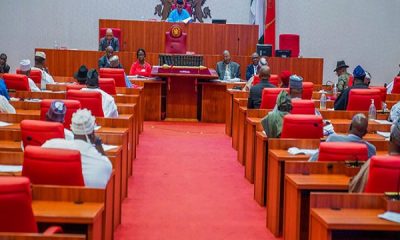
 News7 days ago
News7 days agoSenate approves death penalty for drug traffickers
-

 Headline5 days ago
Headline5 days agoEFCC bars dollar transactions, orders embassies to charge in naira

